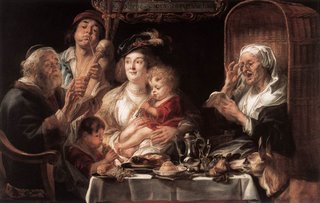
There's lots of effort being made at approaching the erotics of early modern culture, with literary texts being picked over, and the small corpus of Elizabethan pornography given much attention. I am as amused as anyone by Nashe's 'Choice of Valentines' - who could fail to respond to a poem which starts by invoking, pricelessly, 'the merry month of February'?
But the culture was one that generally hid it all well. If we don't look for it in music, we are not looking in the right place. This is John Ward, in 1613, a madrigal setting of a quatrain. 'Phillis' is always a dubious character, and 'frankly' is a code word for 'the opposite of chaste':
Phyllis the bright, when frankly she desired
Thyrsis her sweet heart to have expired,
'Sweet', thus fell she a-crying,
'Die for I am a-dying.'
http://personal.rhul.ac.uk/uhle/001/Phillisthebright.mp3
'That strain again! It had a dying fall!' ~ Phillis asks Thyrsis to join her in her approaching climax, and Ward's madrigal shudders sweetly at its close. I have posted, outside 'Blogger', the Consort of Musicke's 1981 performance, for purposes of comment etc (I cannot see that this music is still available anyway).
Here goes Phillis again, surrendering to pleasure after a bit of persuasion:
He:
Phillis, I fain would die now,
I fain would die now.
She:
O to die what should move thee?
He:
For that you do not love me.
She:
I love thee, but plain to make it,
Ask what thou wilt and take it.
He:
O sweet, then this I crave thee,
Since you to love will have me,
Give me in my tormenting,
One kiss for my contenting.
She:
This unawares doth daunt me,
Else what thou wilt I grant thee.
He:
Ah, Phillis, well I see then,
My death thy joy will be then.
She:
O, no, no, no, I request thee
To tarry but some fitter time and leisure.
He:
Alas, death will arrest me,
You know, before I shall possess this treasure.
She:
No, no, no, dear
He:
No, no, no, no, dear
Both:
No, no, no, no, dear, do not languish,
Temper this sadness,
For time and love with gladness,
Once ere long will provide for this our anguish.
Once again, a link to where I have posted a 1983 performance by the Consort of Musicke, and once again, for purposes of comment, and music that does not seem to be available commercially any more:
http://personal.rhul.ac.uk/UHLE/001/PhyllisIfain.mp3
What Thomas Morley audaciously did here was score for three women to sing 'She' (aka 'Phyllis'), four men as unnamed 'He'. Amateur performance of this song must have been as intimate as a session of 'dauncing signifying matrimony', especially in that responsive interlacing of the voices on 'no, no, no, no, dear'.
Morley himself (well he would, wouldn't he?) represents being able to take your part more or less impromptu as a necessary social grace. Morley's A plaine and easie introduction to practicall musicke, 1597, is dialogue form, and it opens with one of the dialogists scurrying off to put right his own ignorance after experiencing social disgrace:
"But supper being ended, and Musick books, according to the custom, being brought to the table, the mistress of the house presented me with a part, earnestly requesting me to sing. But when after many excuses, I protested unfainedly that I could not, every one began to wonder. Yea, some whispered to others, demanding how I was brought up: so that upon shame of mine ignorance I go now to seek out mine old friend master Gnorimus, to make myself his scholar..."
When you consider just how amorous this otherwise sexually restrained culture seemed prepared to allow its private music to be, you can see the social advantages in being able to perform. Yet, speaking officially, Morley toes the moral line. This is what he says about naughty music (like some madrigals): first he lays the blame on the poets who have written the words, but then insists that once it comes to the musical setting, you have to write as expressively as possible:
"This kind of musicke were not so much disallowable if the Poets who compose the ditties would abstain from some obscenities, which all honest ears abhor ... If therefore you will compose in this kind you must possess your self with an amorous humor (for in no composition shall you prove admirable except you put on, and possess your self wholly with that vein wherein you compose) so that you must in your musicke be wavering like the wind, sometime wanton, sometime drooping, sometime grave and staid, otherwhile effeminate..."
And so he is free to score something as erotically descriptive as he can make it be.
No comments:
Post a Comment